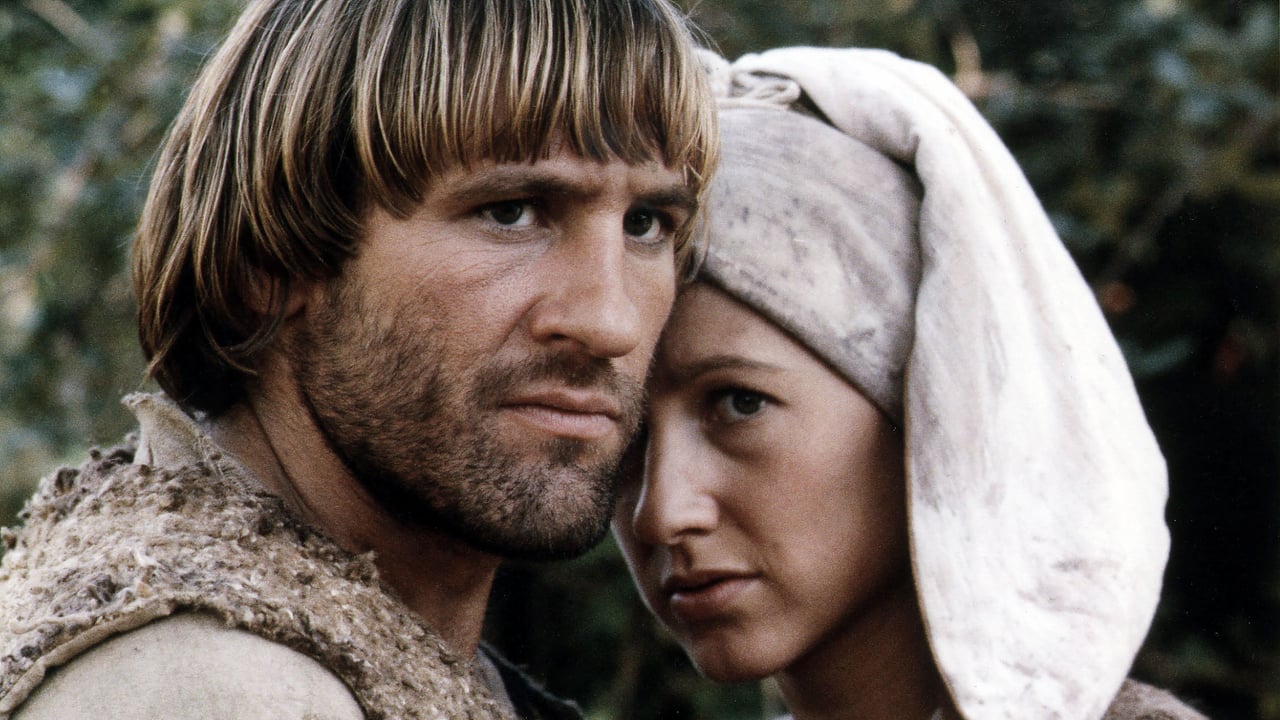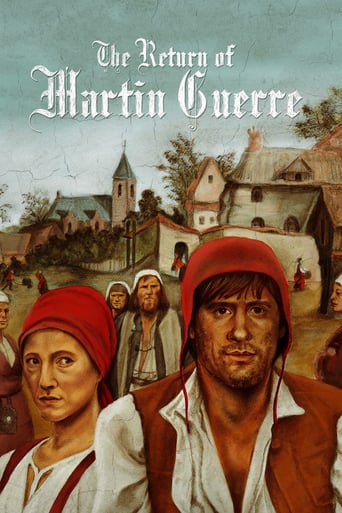

Martin Guerre was a young man who, in 1548, disappeared from the southern French village of Artigat after being accused of stealing grain from his father. Eight years later, a man arrived in Artigat claiming to be Martin. He was accepted as such by Guerre's wife Bertrande and family, and lived with Bertrande as her husband for three years, although some villagers entertained doubts about his identity. Rumours, encouraged by Guerre's uncle Pierre who was involved in a property dispute with his supposed nephew, began to spread that this "Martin" was in fact an impostor. He was arrested and placed on trial, but his intimate knowledge of Guerre's past life and the support he still enjoyed from many villagers seemed likely to secure his acquittal. During the trial, however, there was a dramatic development; another man turned up claiming to be Martin Guerre. It was quickly established that the newcomer was indeed the true Martin and that the impostor was in reality a man from a neighbouring village named Arnaud du Tilh. Du Tilh was convicted and subsequently hanged, adultery and fraud being capital offences in the France of this period. A number of writers and film-makers have taken inspiration from these events, Whereas the later American film "Sommersby" tells a fictitious tale loosely based upon the story of Martin Guerre, transferring the action to nineteenth-century Virginia, Daniel Vigne's film is a reasonably accurate version of the historical events, aiming at a reconstruction of 16th century French peasant life. The main role, that of du Tilh, is taken by Gérard Depardieu, possibly France's finest modern screen actor. His attempts to conquer Hollywood have not been very successful, but I have never seen him give a poor performance in his native language, and this is a fine one, playing his character as a plausible and at times almost likable rogue. He is particularly good in the electrifying trial scene. Whatever else du Tilh may have been, he was clearly a consummate actor, and Depardieu's impassioned speeches reflect his character's knowledge that he needs to give the performance of his life, as that life now depends upon his acting skills. Just as it seems that du Tilh has succeeded in his imposture, Vigne interrupts the proceedings with a brilliant coup de cinema; the sight of a man with a wooden leg entering the courtroom. Or rather the sight of the wooden leg itself- the angle from which the scene is shot means that we see this before we see the man's face. (We have heard it suggested that the newcomer cannot be Martin Guerre because the real Martin, after leaving the village, joined the army and lost a leg in battle). Other acting fine contributions come from Roger Planchon as Jean de Coras, the humane and sceptical lawyer in charge of the investigation, and Nathalie Baye as Bertrande, a young woman placed in a difficult situation by the return of her supposed "husband". It is implied that Bertrande, despite her doubts, welcomed du Tilh into her bed because he was both a better lover and a more considerate husband than the departed Martin, who seems to have been deficient in both departments. I would, perhaps, have welcomed a greater exploration of why du Tilh might have tried to claim another man's identity, although Vigne possibly wanted to create a sense of mystery by keeping alive as long as possible the thought that Depardieu's character might actually be the real Martin. Vigne makes use of few bright colours other than the green of the vegetation and the red of the judges' robes during the trial; in the days before chemical dyestuffs bright colours did not play a large part in the lives of the peasantry. Visually, however, the film is suffused with a warmth of tone reminiscent of an Old master painting; I was particularly put in mind of the works of Breughel and Georges de la Tour celebrating peasant life. It is sometime said that the British are obsessed with the glories of their past, and that in the cinema this is reflected by the large number of films made on a historical theme. French film-makers, however, seem equally obsessed with history, and this was particularly true in the eighties and nineties. "Le Retour de Martin Guerre" is one of a number of fine French films on a historical theme to date from this period. (Others include "Jean de Florette", "Cyrano de Bergerac" and "Le Colonel Chabert", all of which also starred Depardieu). It is well-filmed and well-acted and takes an intelligent and humane look at the strange historical events which inspired it. 8/10
... View MoreOK. This is not a remake of "carrefour", as many may think. This is the actual story, on which carrefour was based, from 16th century France, it just happens to have been transferred to film after the other adaptation. Go read the book if you're at all interested, it's by Janet Lewis and is called "The Wife of Martin Guerre". The story is based on court documents among other things, and the character names in this film are those of the actual people. Don't get confused- carrefour may have been made before this film, but this is the closer adaptation and, thus, should not be labeled a remake.
... View MoreThis isn't a comment on the actual quality of the movie itself, but rather a response to the number of postings which have suggested this movie is not an original concept.I have some shocking news for you, but there really was a Martin Guerre. His court case in the mid-16th century is well documented in primary sources and this movie attempts to retell this story.In 1983, historian Natalie Zemon Davis, who incidentally was originally involved with the film as an historical consultant, wrote a well received micro-history on the court case and it's outcome. (The Return of Martin Guerre - published by Harvard University Press, 1983)This case was thought of as unusual even during the 16th century. So much so, that it became part of French folklore. Earlier Hollywood movies likely tapped into this folklore, when they penned similar stories.So this film, rather than simply being another in a long line of similar movies, is the first to tackle the "original story". That being said, the movie is not perfect and strays from the facts a great deal. Natalie Zemon Davis, herself, states in her introduction to her book that she was troubled by the film's creative license with history.Nevertheless, I recommend anyone to see this film yourself and make up your own mind. Better yet, read the book!
... View MoreSpoilers herein.I have had a lot of trouble with this film. When I watch films, I look for two intents: the intent I observe, and the one I deduce was intended. They are often not the same because filmmakers are like any other artists; often they work by intuition and don't explicitly see what they are doing.I know what I saw. But in this case, I don't know what was intended. That's because we have a muddle. This is an extraordinary visit to another world, and is transporting on that basis alone, like ` Heart of Glass.' But we also have the revealed conspiracy of the pair for sex (and companionship). We have the investigation and hanging. It is just not clear what the filmmaker had in mind other than following the script.Here's what I got:Many films are about films or acting, sometimes in the clothing of `the con.' Here we have a story people by actors who convince, and that story is about a character who is an actor who convinces. He convinces thoroughly until he demands too much of his audience, and then some of them rebel.That is a clever manner of folded storytelling: a story about storytelling and why it works: because life has abandoned us and left us without a narrative as it has gone off to war. Ted's Evaluation -- 2 of 3: Has some interesting elements.
... View More